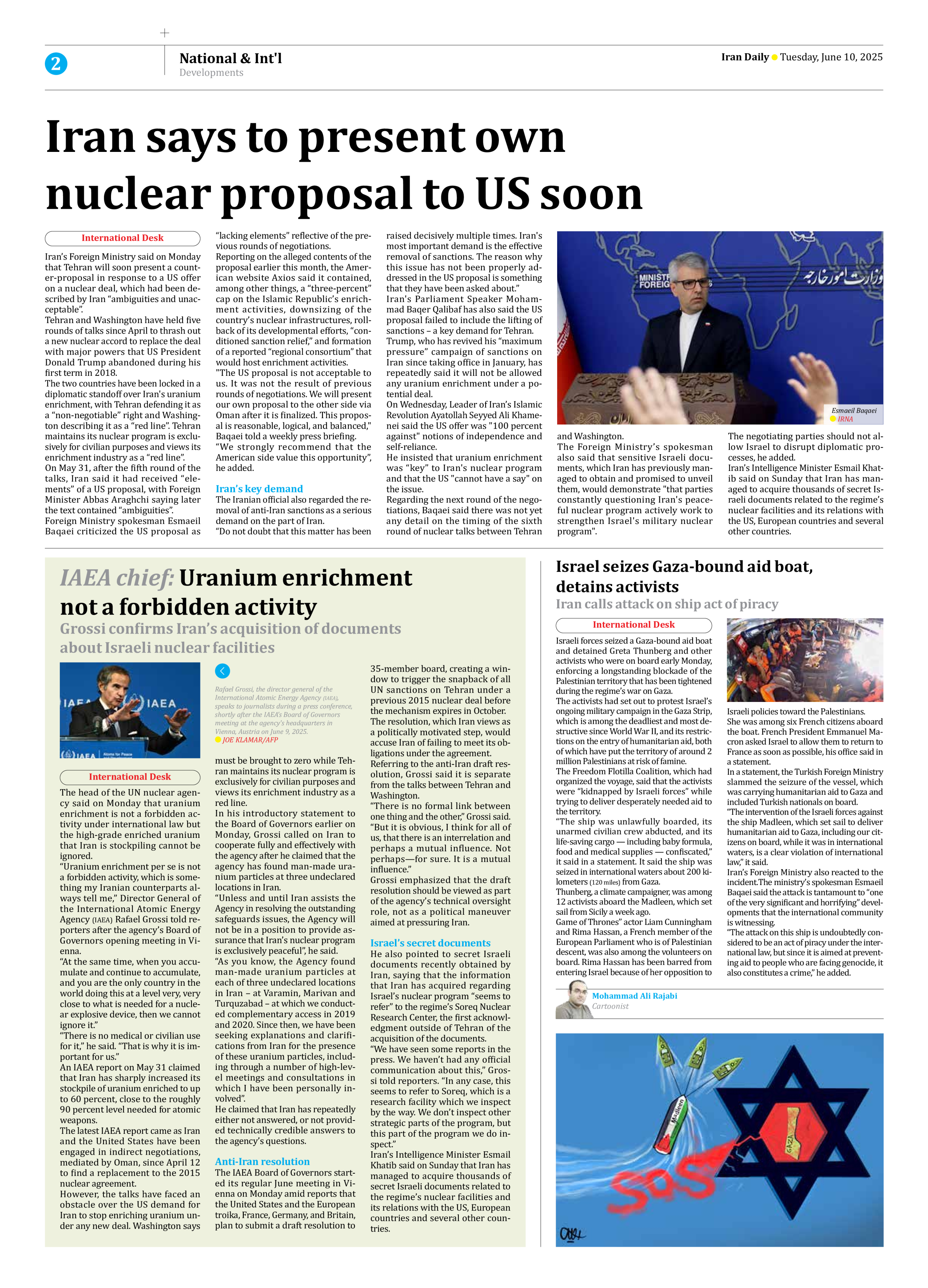
Copy in clipboard...
IAEA chief: Uranium enrichment not a forbidden activity
Grossi confirms Iran’s acquisition of documents about Israeli nuclear facilities
The head of the UN nuclear agency said on Monday that uranium enrichment is not a forbidden activity under international law but the high-grade enriched uranium that Iran is stockpiling cannot be ignored.
“Uranium enrichment per se is not a forbidden activity, which is something my Iranian counterparts always tell me,” Director General of the International Atomic Energy Agency (IAEA) Rafael Grossi told reporters after the agency’s Board of Governors opening meeting in Vienna.
“At the same time, when you accumulate and continue to accumulate, and you are the only country in the world doing this at a level very, very close to what is needed for a nuclear explosive device, then we cannot ignore it.”
“There is no medical or civilian use for it,” he said. “That is why it is important for us.”
An IAEA report on May 31 claimed that Iran has sharply increased its stockpile of uranium enriched to up to 60 percent, close to the roughly 90 percent level needed for atomic weapons.
The latest IAEA report came as Iran and the United States have been engaged in indirect negotiations, mediated by Oman, since April 12 to find a replacement to the 2015 nuclear agreement.
However, the talks have faced an obstacle over the US demand for Iran to stop enriching uranium under any new deal. Washington says must be brought to zero while Tehran maintains its nuclear program is exclusively for civilian purposes and views its enrichment industry as a red line.
In his introductory statement to the Board of Governors earlier on Monday, Grossi called on Iran to cooperate fully and effectively with the agency after he claimed that the agency has found man-made uranium particles at three undeclared locations in Iran.
“Unless and until Iran assists the Agency in resolving the outstanding safeguards issues, the Agency will not be in a position to provide assurance that Iran’s nuclear program is exclusively peaceful”, he said.
“As you know, the Agency found man-made uranium particles at each of three undeclared locations in Iran – at Varamin, Marivan and Turquzabad – at which we conducted complementary access in 2019 and 2020. Since then, we have been seeking explanations and clarifications from Iran for the presence of these uranium particles, including through a number of high-level meetings and consultations in which I have been personally involved”.
He claimed that Iran has repeatedly either not answered, or not provided technically credible answers to the agency’s questions.
Anti-Iran resolution
The IAEA Board of Governors started its regular June meeting in Vienna on Monday amid reports that the United States and the European troika, France, Germany, and Britain, plan to submit a draft resolution to 35-member board, creating a window to trigger the snapback of all UN sanctions on Tehran under a previous 2015 nuclear deal before the mechanism expires in October.
The resolution, which Iran views as a politically motivated step, would accuse Iran of failing to meet its obligations under the agreement.
Referring to the anti-Iran draft resolution, Grossi said it is separate from the talks between Tehran and Washington.
“There is no formal link between one thing and the other,” Grossi said.
“But it is obvious, I think for all of us, that there is an interrelation and perhaps a mutual influence. Not perhaps—for sure. It is a mutual influence.”
Grossi emphasized that the draft resolution should be viewed as part of the agency’s technical oversight role, not as a political maneuver aimed at pressuring Iran.
Israel’s secret documents
He also pointed to secret Israeli documents recently obtained by Iran, saying that the information that Iran has acquired regarding Israel’s nuclear program “seems to refer” to the regime’s Soreq Nuclear Research Center, the first acknowledgment outside of Tehran of the acquisition of the documents.
“We have seen some reports in the press. We haven’t had any official communication about this,” Grossi told reporters. “In any case, this seems to refer to Soreq, which is a research facility which we inspect by the way. We don’t inspect other strategic parts of the program, but this part of the program we do inspect.”
Iran’s Intelligence Minister Esmail Khatib said on Sunday that Iran has managed to acquire thousands of secret Israeli documents related to the regime’s nuclear facilities and its relations with the US, European countries and several other countries.







